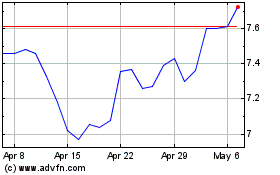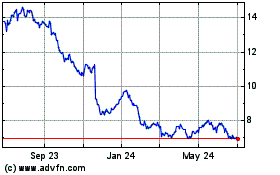Trump Administration Backs Bayer in Weedkiller Court Fight--2nd Update
December 20 2019 - 6:14PM
Dow Jones News
By Jacob Bunge and Timothy Puko
The U.S. Environmental Protection Agency is backing Bayer AG in
the German chemical maker's high-stakes court fight over the
world's most widely used weedkiller.
The main U.S. pesticides regulator, working with the Justice
Department, filed court papers Friday supporting Bayer's argument
that glyphosate, the active ingredient in the company's Roundup
herbicide, poses no cancer risk. The filing backs Bayer's appeal in
federal court of a $25 million verdict in the case of a California
man who blamed Roundup for causing his non-Hodgkin lymphoma, one of
tens of thousands of similar cases.
Lawyers for both government agencies argued the verdict should
be overturned because it would have been illegal for Bayer to print
cancer-risk warnings on Roundup labels. They said Congress granted
the EPA the sole authority over safety labels on chemical products,
and the agency wouldn't have approved a cancer warning for
Roundup.
While it isn't the first time a regulator has weighed in on such
a case, legal scholars said the filing would likely catch the
appeals court's attention. The federal government will often weigh
in on cases when the interpretation of a federal statute is
involved.
Several Roundup trials have been postponed in recent months as
Bayer and plaintiffs' attorneys try to negotiate a settlement as
part of a court-ordered mediation overseen by Ken Feinberg. Mr.
Feinberg has helped divvy up compensation to victims in several
high-profile cases, including the 9/11 terrorist attacks and the
2010 Deepwater Horizon oil spill.
Bayer is under pressure to resolve the litigation after the
company's shares dropped 23% since the first verdict in August
2018, with the company since then divesting several businesses and
laying off thousands of staff world-wide. In the spring, investors
refused to back the actions of Bayer's management in a vote at the
company's annual shareholder meeting. Bayer acquired Monsanto Co.,
Roundup's maker, in June 2018 for $63 billion.
The EPA's filing reiterates the agency's long-held view that
glyphosate doesn't represent a cancer risk, most recently upheld in
a December 2017 review.
"EPA has a longstanding position -- It's not just this
administration which determined that this pesticide does not cause
cancer," said Jeffrey Clark, the assistant attorney general of the
Environment and Natural Resources Division at the Justice
Department in an interview. "EPA should be in control. Congress set
it up that way."
That view is being challenged in U.S. courtrooms, where farmers
and residential gardeners have pointed to the International Agency
for Research on Cancer's 2015 classification of glyphosate as
"probably carcinogenic to humans," while criticizing company-funded
studies that the EPA and other regulators have included in their
glyphosate assessments.
Bayer rejected IARC's link between glyphosate and cancer, saying
the agency cherry-picked some studies and ignored others that
regulators have used to establish the chemical's safety.
Three consecutive juries ruled in favor of plaintiffs over the
past year and a half, awarding hundreds of millions of dollars in
damages. The EPA's brief comes in the case of Edwin Hardeman in the
Ninth U.S. Circuit Court of Appeals, the only one of the three
trials so far to take place in federal court.
Aimee Wagstaff, an attorney for Mr. Hardeman, called the appeal
a "Hail Mary" and said courts have previously rejected the argument
made by the company and the government that federal regulations
should negate the civil lawsuits. "We are confident the Ninth
Circuit will also reject Monsanto's argument and rule in favor of
Mr. Hardeman," she said.
U.S. regulators and administration officials have stepped up
their defense of glyphosate, the most widely used weedkiller among
U.S. corn and soybean farmers, as the number of lawsuits balloons
and some towns and countries have moved to ban the spray.
In August, EPA Administrator Andrew Wheeler said the agency
wouldn't permit cancer warnings to be included on jugs of Roundup
and other glyphosate-based herbicides, calling it a potentially
false claim as the EPA has determined the chemical to be safe. That
directive came after California unsuccessfully tried to require
cancer warning labels for glyphosate, citing IARC's classification
of glyphosate as a probable carcinogen.
Bayer argued in its own recent Hardeman case filing that the
EPA's refusal to allow warnings should override the jury's
decision. The company argued it cannot be held liable by the jury
for marketing a legal product with an EPA-approved label, which
many scientists and regulators say isn't carcinogenic.
The EPA's brief mirrors those arguments. It says that while
states can restrict the sale or use of pesticides, they cannot set
any requirements for what can go on the label, adding only the EPA
can.
The EPA's filing could give Bayer additional ammunition as the
company faces more scheduled trials in 2020. Plaintiffs' central
argument -- that Bayer knew its herbicide posed a cancer risk, and
failed to warn users -- could be challenged because the product's
chief regulator barred manufacturers from including such a warning,
lawyers said.
The appeals court judges "may not ultimately agree with the side
the government is supporting for other reasons," said Ben Feuer, an
appellate lawyer in San Francisco, but the agency's brief "is going
to be closely parsed and they will engage with it."
Sara Randazzo contributed to this article.
Write to Jacob Bunge at jacob.bunge@wsj.com and Timothy Puko at
tim.puko@wsj.com
(END) Dow Jones Newswires
December 20, 2019 17:59 ET (22:59 GMT)
Copyright (c) 2019 Dow Jones & Company, Inc.
Bayer Aktiengesellschaft (PK) (USOTC:BAYRY)
Historical Stock Chart
From Dec 2024 to Jan 2025

Bayer Aktiengesellschaft (PK) (USOTC:BAYRY)
Historical Stock Chart
From Jan 2024 to Jan 2025
